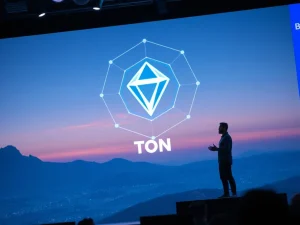Theta Network Unleashes Revolutionary AI Power with Amazon Chips: A Game-Changing Leap for Decentralized Computing

In a move set to reshape the landscape of decentralized computing, Theta Network has announced a groundbreaking integration: becoming the first blockchain network to leverage Amazon’s specialized AI chipsets, Trainium and Inferentia. For anyone tracking the convergence of blockchain and artificial intelligence, this development isn’t just news; it’s a monumental step towards a more efficient, cost-effective, and democratized future for AI processing. Let’s dive into what this means for the crypto world and beyond.
What’s the Buzz About Amazon AI Chips in Decentralized Computing?
Imagine a world where powerful AI computations aren’t solely confined to massive, centralized data centers. That’s the vision Theta Network is pursuing by integrating Amazon AI chips. Specifically, they’re utilizing Amazon Trainium for high-performance AI model training and Amazon Inferentia for cost-efficient AI inference. These are not just any chips; they are purpose-built silicon designed by Amazon to handle the intense computational demands of artificial intelligence.
Trainium: Optimized for deep learning training, allowing developers to iterate faster and build more sophisticated AI models.
Inferentia: Designed for high-throughput, low-latency inference, making real-time AI applications more feasible and affordable.
This integration marks a significant advancement because it brings the raw power of cutting-edge, centralized AI hardware into a decentralized framework. It’s a bold statement about Theta’s commitment to pushing the boundaries of what’s possible in the blockchain space, particularly for resource-intensive tasks like large-scale AI model training and inference.
How Does Theta’s EdgeCloud Hybrid Infrastructure Benefit?
At the heart of Theta’s strategy is its EdgeCloud Hybrid infrastructure. This innovative setup combines the distributed computing resources contributed by users worldwide with the robust capabilities of Amazon’s EC2 instances. The synergy created by this hybrid model is where the true magic happens, especially with the new chip integration.
By leveraging Trainium and Inferentia, the EdgeCloud Hybrid infrastructure can:
Boost Performance: Accelerate AI model training cycles and ensure rapid deployment of trained models for real-time applications.
Enhance Efficiency: Process complex AI workloads faster, reducing the time and computational power required.
Improve Cost-Effectiveness: Significantly lower per-computation costs for AI tasks, making advanced AI more accessible.
This powerful combination positions Theta to support next-generation applications, from dynamic content moderation to sophisticated AI-driven media creation, all with lower latency and higher scalability than ever before. It’s about making high-performance computing available to a wider audience, breaking down traditional barriers.
The Rise of Decentralized AI: Why This Matters
The concept of decentralized AI is gaining significant traction, and Theta Network’s latest move is a prime example of its potential. Traditional centralized cloud services often grapple with balancing scalability and affordability, especially for the demanding tasks of deep learning and AI. By distributing workloads across a decentralized network, Theta offers a compelling alternative.
This approach democratizes access to powerful cloud resources, allowing developers and creators to innovate without being constrained by the high costs or single points of failure inherent in centralized models. For example, imagine personalized content recommendations that are not only accurate but also respect user privacy by processing data closer to the source, or live video analysis that can adapt and scale on demand across a global network of computing nodes. This is the promise of decentralized AI.
Theta Network‘s Strategic Edge in Blockchain Computing
By being the first blockchain network to deploy Amazon’s AI-specific hardware, Theta Network solidifies its position as a frontrunner in high-performance blockchain computing. This integration highlights a growing trend: the powerful convergence of blockchain and AI, where decentralized infrastructure can offer resilience, transparency, and significant cost advantages over traditional centralized models.
However, this ambitious leap isn’t without its challenges. Integrating centralized hardware like Amazon’s chips into a decentralized framework requires careful consideration of:
Complexity: Ensuring seamless operation and data flow between disparate systems.
Dependencies: Managing reliance on third-party providers while maintaining network autonomy.
Decentralization Ethos: Balancing the benefits of cutting-edge technology with the core principles of decentralization to ensure long-term success and trust.
Theta’s ability to navigate these complexities will be crucial as it continues to attract developers and enterprises seeking robust, scalable, and cost-effective solutions for building AI applications without relying solely on centralized cloud giants.
The Road Ahead for Theta Network: Redefining Decentralized AI
The strategic adoption of Amazon’s chipsets by Theta Network aligns perfectly with broader industry trends. As AI models become increasingly complex and data-hungry, the demand for scalable and cost-effective computing solutions will only intensify. Theta’s EdgeCloud Hybrid model directly addresses this need, offering a distributed approach that mitigates single points of failure and reduces operational costs, making it an attractive option for innovators.
This move may also accelerate the adoption of blockchain-based solutions in critical sectors like media and entertainment, where real-time AI processing is becoming indispensable for everything from content creation to user experience. The future success of Theta’s platform will depend on its capacity to maintain performance parity with centralized alternatives while rigorously ensuring security, interoperability, and the ability to adapt to emerging hardware advancements.
The integration of Amazon’s chipsets is more than just a technical upgrade; it’s a clear statement of intent. It signals Theta Network’s unwavering commitment to redefining the boundaries of decentralized computing in the burgeoning AI era, paving the way for a future where advanced AI capabilities are accessible, efficient, and truly decentralized.
Frequently Asked Questions (FAQs)
Q1: What are Amazon Trainium and Inferentia chips?
Amazon Trainium and Inferentia are specialized AI chipsets designed by Amazon Web Services (AWS). Trainium is optimized for high-performance machine learning model training, allowing for faster development and iteration of complex AI models. Inferentia, on the other hand, is built for efficient and cost-effective AI inference, which means deploying trained models for real-time predictions and applications with high throughput and low latency.
Q2: How does Theta Network’s integration of these chips benefit users and developers?
The integration significantly enhances Theta Network’s EdgeCloud Hybrid infrastructure, leading to improved performance, efficiency, and cost-effectiveness for AI workloads. For users, this means faster access to AI-driven applications and services. For developers, it lowers the barrier to entry for building and deploying sophisticated AI models on a decentralized network, enabling faster training cycles and more affordable inference, ultimately fostering innovation in areas like media creation and real-time content analysis.
Q3: What is Theta’s EdgeCloud Hybrid infrastructure?
Theta’s EdgeCloud Hybrid infrastructure is a unique computing model that combines distributed, user-contributed computing resources (like those from Theta Edge Nodes) with powerful centralized cloud resources, specifically Amazon EC2 instances equipped with Trainium and Inferentia chips. This hybrid approach aims to optimize AI workloads by leveraging the best of both decentralized and centralized computing, providing scalability, resilience, and cost benefits.
Q4: What are the main challenges Theta Network might face with this integration?
While highly beneficial, the integration presents challenges such as the complexity of seamlessly integrating centralized hardware into a decentralized blockchain framework. There’s also the ongoing task of managing dependencies on third-party providers like Amazon while upholding the network’s decentralized ethos. Maintaining the delicate balance between leveraging cutting-edge technology and preserving the core principles of decentralization will be crucial for Theta’s long-term success.
Q5: How does this integration align with broader industry trends?
This integration directly addresses the escalating demand for scalable and cost-effective computing solutions as AI models become increasingly complex. By distributing AI workloads across a decentralized network, Theta’s model mitigates single points of failure and reduces operational costs, aligning with the industry’s need for more resilient and efficient AI infrastructure. It also signals a stronger convergence of blockchain and AI technologies, attracting developers and enterprises looking for alternatives to purely centralized cloud providers.








